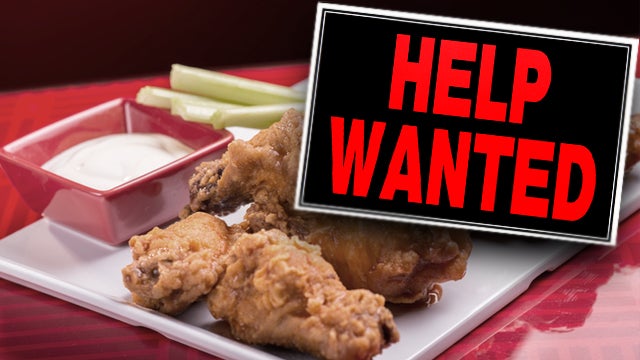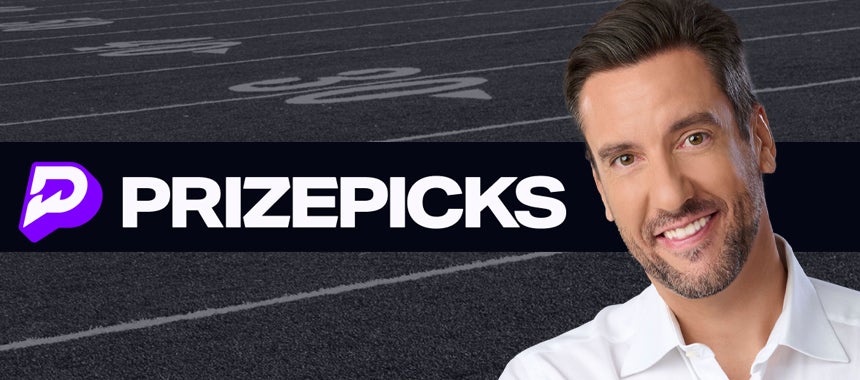Trip to Buffalo Wild Wings Shows What’s Wrong with Biden Economy
28 Jun 2021
CLAY: Buck, I had an interesting experience on Sunday that, to me, really kind of ties in with the failures of a return to normalcy in this country. We have 9.3 million open jobs right now. That is the most open jobs that have ever existed in the history of this country. That is more open jobs than there are people seeking work. These unemployment benefits — which are being levied mostly now in blue states.
The Wall Street Journal last week said in 19 states, if you have a couple in a household, they can make over $100,000 a year right now not working at all. And this all kind of crystallized for me, Buck, when I walked in… My kids love Buffalo Wild Wings. They love to eat the wings. They like to watch sports.

It is a free advertisement on some level for Buffalo Wild Wings here. They like to sit down, watch the games, eat the wings; they wanted to go out there Sunday. So I took a carload of kids, pulled up to Buffalo Wild Wings near my house, walked in, and there was a girl standing right there in the front.
She said, “We have no buffalo wings here because drivers are not willing to work to deliver our product.” Also, same time, same weekend, Chick-fil-A, which is a Southern delicacy… I know it’s also popular in New York City. I see the lines every time I’m around there, Buck.
Chick-fil-A’s not open because they also couldn’t get product delivered to their stores. I drove to another restaurant that we usually love to go to. It’s not open now on Sundays because they can’t get enough waitstaff. This is an issue everywhere. Let’s open up the phone lines ’cause I’m curious for a lot of small business owners out there to be able to react. This is gonna go all the way up until September right now in many states.
Are you seeing the same thing, Buck Sexton, as it pertains to these scenarios?
BUCK: It’s absolutely happening in a bunch of the big blue states. It’s happening in New York, which has been hit really badly by a lot of these policies and what’s happened as a result of Biden coming into office and deciding to get as close to Modern Monetary Theory and just using the federal government — pretending like the federal government’s purse doesn’t have any end.
I mean, you just spend the money you want to spend. But I also think that what you’re seeing… This is true on the economic front with the jobs. It’s true in so many different places right now where Democrats have control, either at the federal level or in states where they’re in charge. They act like they have no understanding of cause and effect.
We sit here and we say, “Of course somebody who’s going to be able to make a certain income staying home,” and doing whatever they want with their time, right? They’re being paid for their time, particularly these hourly wage jobs that we are predominantly talking about. They’re being paid for their time.
And if they can stay home and make a solid salary, it’s not just a question of what that money is. It’s what’s the value of not having too deal with any job, right? So people who say, “Well, pay them more.” You gotta pay them a lot more. Getting paid to do nothing versus getting paid to actually have to show up and do a job? There’s a value proposition that I think you have to work into it.
But I think we just see this across the board, Clay, we’re on — whether it’s on law enforcement issues or it’s on these incentive structures for going back to work, there’s an unwillingness to see what is obvious because Democrats elevate emotion over reason. They disassociate cause and effect. They believe that their plans, their central planning will result in better outcomes. But what their planning actually results in is you and your kids not having wings. That’s what actually happens.

CLAY: It is funny, because it crystallized, and my kids were like, “Wait a minute, Buffalo Wild Wings doesn’t have wings?” and, “What do you mean Chick-fil-A doesn’t have chicken sandwiches because…?” Some people out there… I think you made a good point there. Immediately when I tweeted about this, people said, “Well, just pay the workers more and you’ll solve it.”
But that’s not what’s going on. It’s not as if some competitor of Buffalo Wild Wings out there is paying a dollar more and everybody is deciding to work there instead — which would be the capitalistic response here, right? Build a better mousetrap. What you’re doing is you’re competing with government paying for people to do nothing.
I think it’s not only people not wanting to work, Buck. I think it’s also they’ve terrified a certain segment of the population that they’re gonna die of covid, right, if they go out and try to go to work. And I think also that now that we’re moving into summer, there’s the childcare issue.
For many women one of the most underreported stories has been that we’re at a 30-year high for women’s unemployment rate because I think a lot of women bear most of the child care responsibilities. But to me it’s pretty transparent. We talked about this off air, Buck. There’s a difference between somebody who has to work in order to live and basically the career versus job, right?
And if you’ve ever had a situation where you had to go to a crappy job that you didn’t love because you have to pay bills, which a huge percentage of the population has, there’s a lot of people out there that are making more money than they ever have before without having to do a single thing. In 19 states, you could make $100,000 a year without working at all, a couple can.
BUCK: I think everyone has to also remember that we act under the assumption right now that Democrats want things to go back to normal at some level, with the economy in particular, but in general they want to go back to precovid normal. I think that’s misunderstanding of what the actual goal is here. I don’t think they’re done. I don’t think that they want the emergency to end.
I think they’ve transformed, at some level, the relationship between citizen and state in their minds. Think about what’s happened here. The government, for the first time ever, told people, “You can’t do your job. We will send you a check. You must stay home. We will tell you when you can do your job again.
“And we’ll spend whatever we decide is necessary in the meantime, to keep things going.” You got a lot of people who were economically not only unaffected by this, but the elites were pushing this — I’m sure you saw — people got wealthier over the course of covid. If you had assets, if you owned stocks, if you owned a house, if you were in pretty good shape. You have the stats right there?
CLAY: Yeah, I got it right in front of me. Any jaw dropped when I saw this. This was from the Wall Street Journal today, Buck. The headline is, “Most Americans Got Richer During the Pandemic,” and you look at the overall data — and this, to me, kind of crystallized it. The last time we had a recession in this country, a serious one, in 2008, U.S. households lost $8 trillion.
Just tried to take boys to Buffalo Wild Wings, but they are out of almost all food — including wings — because they said there aren’t enough drivers willing to work & deliver food to their restaurants. Wild. FYI, there are 9.3 million open jobs in the country, most in US history.
— Clay Travis (@ClayTravis) June 27, 2021
That stock market decline, the subprime mortgage crisis, everything else. This “crisis” — crisis in quotation marks — U.S. households added $13.5 trillion in wealth last year. So we didn’t have a real recession. Basically, we put the economy on ice, right, in a coma and continued to flood the marketplace with money, and now we’re trying to figure out how to come out of that coma. But everybody suddenly after being put in the deep sleep added $13.5 trillion in wealth.
BUCK: And also, there are many lies that were told about this whole covid lockdown situation all along. One of the biggest ones and one of the most obvious ones from the very beginning was that we’re all in this together because we really weren’t all in this together certainly economically. There are a lot of people who were able to just continue on. People I know in media often preferred their work schedule of being able to be at home.
CLAY: Yes.
BUCK: A lot of people who work as journalists now never had be to go back into a newsroom, and you play that out. Across the work from home community which is 10s of millions of Americans, they saw this as an opportunity to essentially order in more food and spend more time on Amazon. While it was actually a lot of the front-line workers, the hourly wage workers who had to keep doing their jobs.
CLAY: Yeah.
 BUCK: And this is prevaccine too. They were showing up. They were doing everything. And the people that have been hurt by this largely economically are the ones who the government said, “You can’t do your job anymore.” They’re the ones that have actually been hit by this.
BUCK: And this is prevaccine too. They were showing up. They were doing everything. And the people that have been hurt by this largely economically are the ones who the government said, “You can’t do your job anymore.” They’re the ones that have actually been hit by this.
But think about also how this changes the mentality and changes the relationship, I think, going forward between the vast bulk of hourly workers and people that are trying to pay their bills, are struggling to get it done, or small business owners. Now they recognize it — and the Democrats see this, I think, as an opportunity. They talk about fundamental transformation, right?
They can continue on now with covid restrictions in the background that will come, I believe — and we’ll be talking more about this. They are gonna return. They can decide that they’re going to just write checks to people to stay home. I mean, remember when Andrew Yang was running for president —
CLAY: Yes.
BUCK: — in the Democratic presidential primary, instead of mayor of New York (which is not gonna happen), and the big idea was that he was gonna have effectively universal basic income. I think he was calling it like freedom cash or whatever it was at the time. We created a form of basic income right now and running up trillion dollars of debt and we’re telling people to stay home and we’re wondering why aren’t we getting back to normal with the economy more quickly, Clay? It’s because people want control. They don’t want it to go back to what it was.
CLAY: There’s no doubt, and to your point I think it’s been one of the great underreported and underdiscussed topics. People who have information-type jobs were overwhelmingly able to work from home and continue to have better lifestyles. Like you said, they just get to order from Amazon and sit around and watch Netflix and they have more flexibility ’cause they don’t have to spend two hours a day commuting.
Financial activity: 78% can work remote. Information tech: 71%. Professional and business services: 70%. All the way down to leisure and hospitality. Only 13% of people in the leisure and hospitality industry can actually work remote, 17% of construction workers can work remote. We took and taxed, basically, the richest people. We gave them an unbelievable stimulus — again, $13.5 trillion in wealth added in the last year.
Compare that with the Great Recession when households lost $8 trillion. And so people are flush with cash, and that has tangible impact when it comes to being willing to actually take a job. And how do you sort of, for lack of a better term, take these people off of the government teat?
Remember when Gavin Newsom came out and said, “We can’t ever go back to normal,” in his speech inside of Dodger Stadium, because normal wasn’t good enough? They are seeking a transformative nature of change which the government is going to have an unbelievable part of.
 BUCK: They have not taken full advantage of the crisis yet. That’s really, I think, a very widespread mind-set at the very top of the Democrat Party. They are not done. Obviously, the infrastructure back and forth we’ve seen is a part of this.
BUCK: They have not taken full advantage of the crisis yet. That’s really, I think, a very widespread mind-set at the very top of the Democrat Party. They are not done. Obviously, the infrastructure back and forth we’ve seen is a part of this.
CLAY: Yeah.
BUCK: They’re trying to get things they would not be able to otherwise. And I think that what we’ve seen all along is that the reality of the economic divide and the pandemic was you had management consultants who live in Santa Monica and Brooklyn who were watching MSNBC and then tweeting out how they double mask and believe the science, while truck drivers and hospitality workers and people at restaurants and things were actually having to deal with customers.
CLAY: Grocery store workers.
BUCK: Gas stations, people that have to be there.
CLAY: Small business owners.
BUCK: They were being told, “Sorry, your life’s work is up in smoke.” And, by the way, you asked how things are by me. I was back in New York City over the weekend. One thing that you do see: There are businesses, there are restaurants that now everyone’s finally realizing what some of us were saying all along: They’re never coming back. They’re gone now.
And what does that actually mean economically for not just the families who own them or work in them and others, but for the comeback of some of these cities that I think is anticipated? I think it’s gonna be much more difficult than folks realize.
Recent Stories
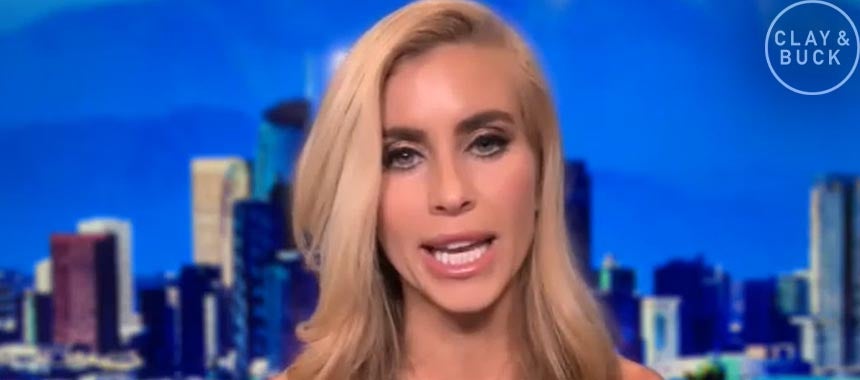
Katie Zacharia Previews the Funky California Gubernatorial Primary
Katie addresses the GOP's uphill battle to take back the state.
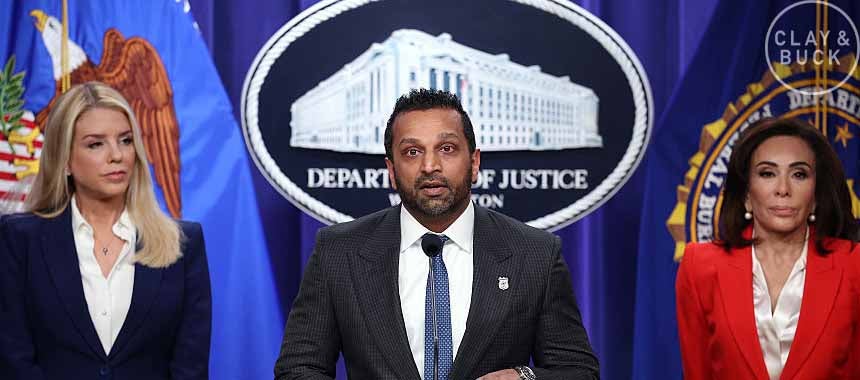
CAPTURED: Benghazi Attack Mastermind Arrested
America under Trump will hunt down anyone who kills Americans.
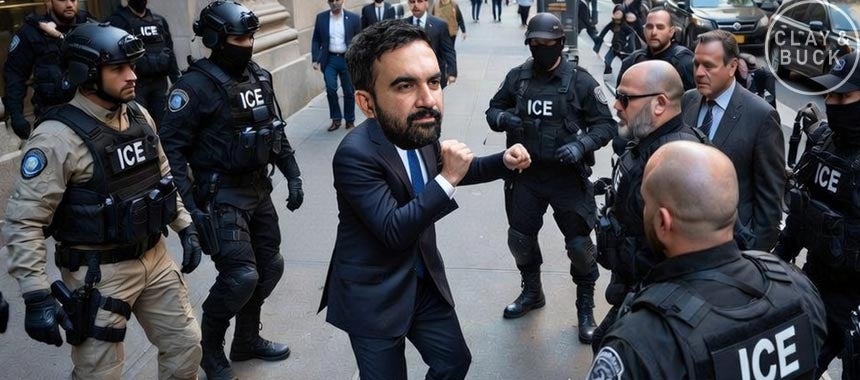
Mamdani Makes New York Ground Zero in the ICE Fight
Buck counsels the Trump administration to take the immigration battle to NYC.

VIP Video: With Benghazi Arrest, This Administration Nails It Again
Another big win for the Trump team.


